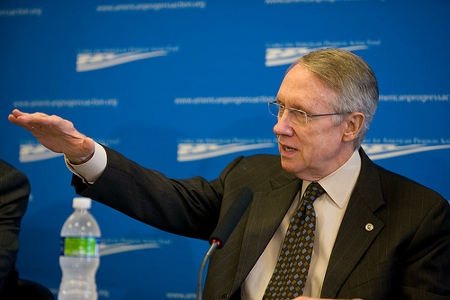Chris Gilson looks at the best in political blogging from the Beltway. Our state blog round up will follow tomorrow afternoon.
Roll-out of Affordable Care
The controversy over President Obama’s flagship health reform the Affordable Care Act (also known as Obamacare) continued this week. On Saturday, The Foundry takes a close look at how Obamacare affects all Americans, saying that not only will it raise healthcare costs for many, but it will also burden future taxpayers with greater spending on insurance exchanges and Medicaid. American Thinker points out that the ‘yes we can’ generation of young people that supported Obama are unlikely to say ‘yes we will’ to Obamacare’s higher premiums.
Last week President Obama announced a ‘fix’ to Obamacare that would allow many to keep their present insurance plans for now. The Atlantic has a guide to everything you might need to know about the ‘fix’, including that it will force insurance companies to tell people who are thinking about keeping their old plans about the Obamacare alternatives, and that the government will cover some of the costs associated with higher risk plans for the first three years. Meanwhile, Via Meadia says that the ‘fix’ has stunned industry experts across the nation (and in Washington, DC), and may be a real headache for insurance companies and commissioners.
American Thinker reports that a Texas State Senator has filed a complaint against the state’s healthcare Navigators, and says that they have advised insurance consumers to under-report their incomes to the Internal Revenue Service. Meanwhile, in Washington DC, an insurance commissioner has been fired for criticising the Obamacare ‘fix’, according to Nice Deb.
On Tuesday, The Lonely Conservative reports that Obamacare is effectively ‘wiping out’ competition in individual healthcare marketplaces across the U.S. On the other side, Wonkblog says that while the change brought by Obamacare is painful, the current healthcare system in the U.S. is a complete disaster, with costs vastly exceeding that of other countries, even when the country pays more for healthcare as a percentage of GDP.
The White House Dossier reports that on Wednesday, the Healthcare.gov site crashed in front of Secretary for Health and Human Services, Kathleen Sebelius, on a visit to Miami. This could be due (at least in part) to 40 percent of the website remaining unbuilt, according to Outside the Beltway. Perhaps with this in mind, the Obama administration announced this week that they were now hoping that only 80 percent of users would be able to sign up without issue by November 30th.
Senate filibuster rules and the ‘nuclear button’
The first part of this week sees Senate Republicans block Presidential nominations to the U.S. Appeals Court for the Washington DC Circuit, under the current 60-vote nomination threshold, also known as the filibuster. The Political Carnival says on Wednesday that it looks like Senate Majority Leader, Democrat Harry Reid, is very likely to ‘push the nuclear button’, and reform the filibuster so that a simple majority of 51 is all that is needed for executive and judicial nominees (except for the Supreme Court) to be approved. On the other side, The Foundry argues that the ‘nuclear option’ goes against the principle that the Senate should take time to debate issues, and may serve the interests of Senate Democrats today, but will come back to haunt them if and when Republicans retake the Senate.

On Thursday, Reid does take the ‘nuclear option’, reports Wonkblog, the first filibuster rule change since 1975. Daily Kos writes that the rules have changed, and that the next step is to end the filibuster on legislation. Meanwhile, Red State looks at whether Senate Republicans will retaliate; arguing that it’s unlikely given that Senate Minority Leader has simply said that Republicans should wait until the next elections in 2014. The American Prospect says that we shouldn’t believe Republican ‘cries of vengeance’ and that they will now try and appoint the most radical conservatives when they next have the White House and the Senate – they would have done this anyway. The Monkey Cage looks at what the filibuster reform now means for the Senate, writing that the change is as landmark as reporters say it is. Finally, on Friday, Via Meadia argues that the change will further depress confidence in public in Washington, and in Congress.
Government and the Beltway
On Monday, National Journal profiles the new ‘Republican flamethrowers’ – those GOP members whose comments on issues such as rape and gay rights make the party mainstream cringe. Meanwhile, Crooks & Liars reports that the Supreme Court has refused to block a new law in Texas that presents obstacles to abortion centers.
Much speculation surrounds the political future of Elizabeth Warren, currently the Senior Senator from Massachusetts. The Atlantic looks at recent commentary that suggests that she may be eyeing a 2016 presidential bid, and concludes that, given her continuing focus on financial reform (something that seems to have left the public consciousness), she is not ready for ‘presidential prime-time’. Meanwhile, Outside the Beltway is not very surprised that the GOP Governor of Wisconsin, Scott Walker has said that the Republican Party should pick a Governor for its Presidential candidate in 2016.
Outside the Beltway considers arguments against voter ID laws, saying that there is little evidence that these types of laws decrease representation for minority groups. Meanwhile, The Foundry looks at the immigration amnesty bill that is currently languishing in Congress, saying that after the controversy of the Obamacare rollout, the President would likely find it far harder to push the bill through if he chose to ‘launch a full-court press for amnesty’. Meanwhile, The Lonely Conservative wonders why the Democrats didn’t pass immigration reform when they had control of the House and the Senate.
Much has been written about the level of political polarization in Washington DC. The Atlantic explains these deep divisions by saying that there are in fact two Americas: Republistan and Democravia, where people of color and immigrants have less and more political power, respectively. Roll Call looks at recent attempts by business-backed challengers to take on Tea Party incumbents in the House, saying that while they have met with some successes, it still remains to be seen if business groups will be bold, aggressive and well-funded enough to beat Tea Party activists. The Monkey Cage reports that the Employment Non-Discrimination Act (ENDA), awaiting consideration by the House, after passing in the Senate, now has a majority of support in every Congressional District.
Fiftieth Anniversary of assassination of President John F. Kennedy

Friday marks the fiftieth anniversary of the death of President John F. Kennedy in Dallas, Texas. On Wednesday, The Hill’s Congress Blog says that Kennedy’s wit and humour are among his strongest legacies, something that we should remember now, when people are yearning for positive leadership with positive messaging. A former member of Kennedy’s administration, writing for The Atlantic looks at how we should remember him, saying that he embodied and championed an era of bold optimism and hard realism. The Lonely Conservative examines Kennedy’s politics, arguing that, despite his status as a Democratic icon; he might not actually be welcome in the Democratic Party today, given his anti-communism and fiscal conservatism.
Foreign policy
The Foundry takes a close look at the idea of ‘American exceptionalism’, saying that while the concept enrages some liberals, America is different – especially from Europe – and that accounts for the country’s successes.
Turning to the recent revelations of NSA spying, American Thinker reports that ‘prop-heads’ working for companies like Google and Facebook in Silicon Valley have begun coding networks and online data to make NSA spying more difficult. They argue that it is encouraging that businesses can act to prevent government prying without warrant.
Via Meadia reports that the UK’s Prime Minister David Cameron has said that he is interested in meeting the Indian Opposition Leader, Narendra Modi, while the Obama administration has ruled out any contact with the controversial figure.
Over at The Monkey Cage, they look at the U.S.’s relative isolation at the current Trans-Pacific Partnership negotiations, given that geographic proximity accounts for many of the overlapping negotiating positions of the other countries. On the other hand, The Hill’s Congress blog says that the country’s role as the preeminent power in the Asia-Pacific is not under threat, especially since trade ties with Southeast Asia have grown.
Hit & Run looks at three drones of the future – unmanned technologies that may be usual in military and civilian life. The Foundry writes that the U.S. military’s current round of budget cuts may threaten the Air Force’s planned Long-Range Strike Bomber, which would be an essential part of the country’s ‘nuclear triad’, which includes missiles and submarines.
The economy and society
Red State casts a critical eye on renewable energy, in the form of wind power. They argue that the reliance of wind turbines on rare earth minerals from China, as well as the dubious economics of the technology means that it is certainly not ‘free as the wind’.
On Saturday, Daily Kos looks at the Supreme Court’s hearing of a case that could seriously impede union organizing efforts, by declaring ‘neutrality agreements’ between unions and employers to be illegal. Meanwhile, Via Meadia looks at the return of debtors’ prisons in America, where those who cannot pay fines for speeding and expired license tags are put on probation, and then potentially in prison.
United Liberty says that more and more Americans are renouncing citizenship (over 2,300 this year) – they maintain it is because of the country’s high tax burden.
Please read our comments policy before commenting.
Note: This article gives the views of the author, and not the position of USApp– American Politics and Policy, nor of the London School of Economics.
Shortened URL for this post: http://bit.ly/1caadhY






